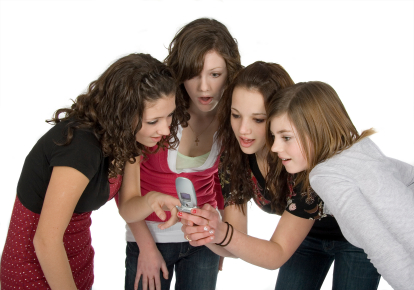Sexting
© 2009 Teresa Cook

One year ago—in April 2008—I wrote about teens sharing nude photos of themselves via cell phones or the
Internet—a trend now known as "sexting" (see "
Child
Produced Porn: Protecting Our Kids from Themselves". Three months later, we saw the dire consequences
this action can have. After months of vicious harassment from peers over a nude photo she sent her boyfriend,
18-year-old
Jessica Logan hung herself.
1
Despite Jessica's death, the practice of sexting thrives. In December 2008, the National Campaign to Prevent
Teen and Unplanned Pregnancy released results of a survey involving more than 1200 teens and young adults. Of
the respondents ages 13 to 19, 20 percent (22 percent of girls, 18 percent of boys) said they have
"electronically sent or posted online nude or semi-nude pictures of themselves." While this means that 80
percent of our youth are not snapping and posting sexually explicit self-portraits, this figure still
represents 1 in 5 teens—1 in 5! 2
Seventy-five percent of the teens surveyed said they knew sending sexually suggestive content can have "serious
negative consequences," yet many of them did it anyway.3 Threat of legal action has not stopped it.
Word of pictures spread globally by ex-boyfriends has not stopped it. Even news of a teen girl's suicide has
not stopped it. So what will stop it?
Young teens rarely consider that anything posted on the Internet has the potential of endlessly floating around
in e-space. What a thirteen-year-old thinks is amusing or sexy or fun today can mean devastation tomorrow—or
ten years from now. The National Campaign to Prevent Teen and Unplanned Pregnancy has posted tips for parents
and teens on how to avoid getting caught in the sexting nightmare at
Before You Hit Send. In an
effort to halt sexting and minimize the number of children affected by legal action, Anne Collier of
ConnectSafely has formulated her own
list of tips. Both resources provide excellent information so I won't repeat their advice here.
Parents can use these tips to initiate conversations about sexting. Since authorities have already charged
middle schoolers in sexting cases, it is critical to begin early—by age 12 or 13 at the latest. Don't assume
your children know the dangers of this "game" just because you do. But more important than imparting
information is the discussion that follows. Impulsivity is a hallmark of teen life. Those who have a chance
to think through their actions and the possible consequences beforehand may be less likely to act upon their
whims.
While I wholeheartedly agree with discussing the dangers of sexting with our children, remember that 75 percent
of teens surveyed already knew about the consequences. Perhaps a deeper issue is at stake here—an issue of the
heart. Only by teaching our children
God's views on sexuality can we expect them to apply God's principals to the situations they encounter. By
teaching our children to hold their bodies in sacred trust as a precious gift for their future spouses, we can
inoculate them against the sexting temptation.
A year ago, news of teens circulating nude photos of themselves had just hit the headlines. Now we have a new
word in our vocabulary, youth on trial for distribution of child pornography, and one girl dead. What will we
see a year from now?
Talk to your children.